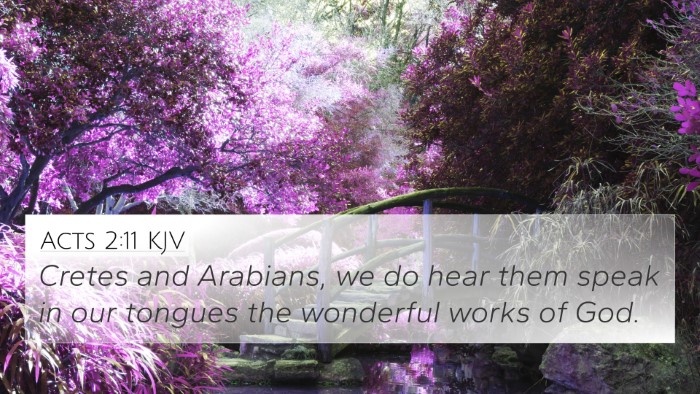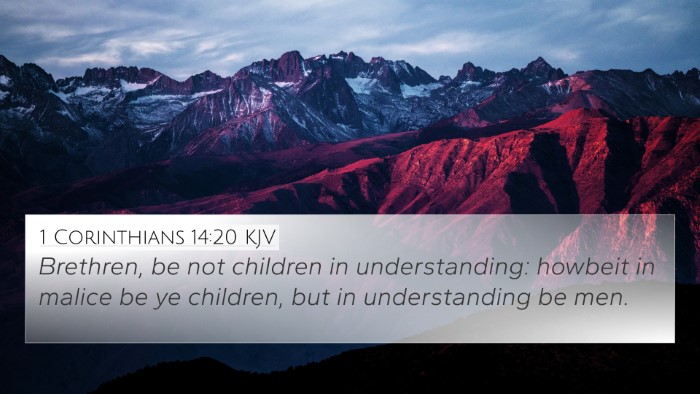Bible Verse Meaning of Acts 10:46
Acts 10:46 states, "For they heard them speak with tongues, and magnify God." This verse is pivotal in understanding the moment when the Holy Spirit was given to the Gentiles, illustrating the breaking down of barriers between Jews and Gentiles in the early Christian church. The significance of this event is best understood by examining the insights from various public domain commentaries, including those of Matthew Henry, Albert Barnes, and Adam Clarke.
Contextual Background
The verse occurs within the narrative of Peter’s visit to Cornelius, a Roman centurion, marking a momentous shift in the early Church's mission. The outpouring of the Holy Spirit upon the Gentiles signifies God's acceptance of all people, regardless of ethnic or cultural backgrounds. Understanding this verse necessitates exploring the connection it creates within the broader themes of divine inclusivity and the expansion of the Gospel.
Commentary Insights
-
Matthew Henry:
Henry emphasizes that this event reveals God’s intention to reach out to all nations, not just Israel. The manifestation of speaking in tongues confirms the divine presence and approval of this new path for the Gospel, heralding the Great Commission's fulfillment (Matthew 28:19).
-
Albert Barnes:
Barnes notes that the act of speaking in tongues served as miraculous evidence of the Holy Spirit's presence among the Gentiles. This event mirrors the Day of Pentecost (Acts 2:4), reinforcing the notion that God's grace and the Holy Spirit are inclusive gifts meant for everyone who believes.
-
Adam Clarke:
Clarke elaborates on the significance of the phrase "magnify God," explaining that it highlights the proper response to divine encounter. This reflects the joy and reverence that comes from recognizing God's work in the lives of the Gentiles, promoting a spirit of worship that is cross-cultural.
Thematic Connections
Acts 10:46 connects profoundly with other scripture, illustrating a consistent biblical theme of inclusion and the power of the Holy Spirit across various contexts. Here are several key verses that create a web of connections:
- Matthew 28:19-20 - The Great Commission, where Jesus commands disciples to make followers of all nations.
- Luke 24:47 - Proclaiming repentance and forgiveness of sins to all nations, indicating the broad scope of the Gospel's reach.
- Acts 2:4 - The initial outpouring of the Holy Spirit at Pentecost demonstrates similar miraculous signs to those seen in Acts 10.
- Romans 1:16 - Paul emphasizes that the Gospel is for everyone, both for the Jew first and also for the Gentile.
- Galatians 3:28 - Affirmation that in Christ, there is no division among ethnicities, illustrating the inherent unity brought by faith.
- Revelation 7:9 - A vision of a multitude from every nation worshipping before God's throne, emphasizing the end-time fulfillment of the Gospel's reach.
- John 3:16 - The declaration of God's love for the world, showing that the invitation for salvation extends to all peoples.
Cross-Referencing Insights
The verse not only serves to advocate for inclusivity but also sparks interest in inter-Biblical dialogue, reinforcing how various biblical texts align thematically. The use of scriptural cross-referencing provides tools for deeper understanding and study:
- Identifying connections: Use a Bible concordance to find related verses that discuss the Holy Spirit's work across different contexts.
- Thematic Bible verse connections: Explore how various scriptures speak to the nature of God's mission beyond the Jewish people.
- Cross-reference Bible study: Engage in a comparative study of this event with similar occurrences in the Scriptures.
Application and Reflection
For believers, Acts 10:46 encapsulates the transformative nature of the Holy Spirit and the inclusivity of the Gospel. It challenges Christians today to reflect on how they can embody this divine openness in their communities and share the impactful truth that God's love transcends all barriers. The apostolic teachings urge modern believers to live out a faith that celebrates diversity and unity within the body of Christ.
Conclusion
Acts 10:46 is more than just a scriptural account; it is a declaration of God's heart for all humanity. By engaging with this verse through careful cross-referencing and thematic exploration, believers can deepen their understanding of the messages contained in the Bible, shaping their faith and practice within the context of God’s inclusive kingdom.







